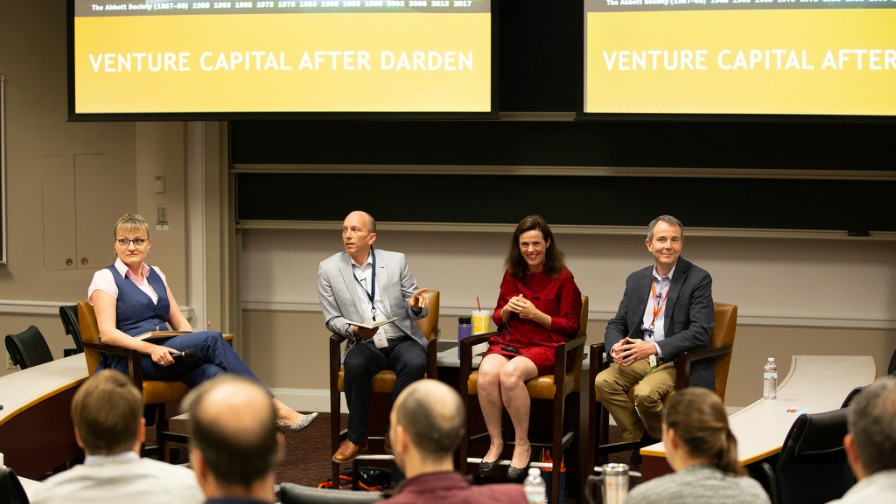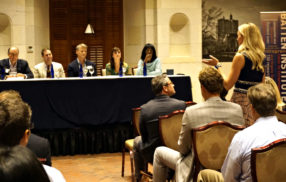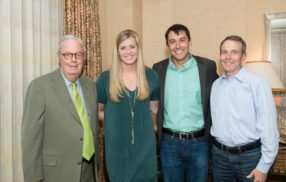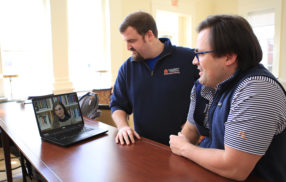
UVA Darden Panel Explores How to Get Started in VC, Ethics and Privacy Concerns of New Tech
By Dave Hendrick
Although there is no clear path to becoming a venture capitalist, there are promising places to start.
Speaking to students and alumni at a University of Virginia Darden School of Business Reunion Weekend panel moderated by Professor Elena Loutskina, three alumni with a track record of success in the industry detailed their own paths to successful careers in “VC,” and offered tactical advice to infiltrating an industry that can appear both insular and opaque.
BlueRun Ventures General Partner Jonathan Ebinger (MBA ’93) said having specific industry expertise is often important, and said his own experience in the communications industry — including starting an early internet shopping company — made him a valuable commodity to a firm like BlueRun, which valued his specific industry knowledge.
“A good investor at our scale is a generalist, but if I’m hiring someone, it will be a specialist,” Ebinger said. “It’s a very bespoke industry and each person is handcrafted to fit into a need we have.”
Sean Foote (MBA ’93), founder and managing director of Co=Creation=Capital, was a consultant with the Boston Consulting Group before deciding to become a VC in order, he said, to “see all the cool technologies before my kids did.”
Foote described venture capital as “still an artisan business with apprentices,” but said the industry was in the midst of significant change.
“I’m really interested to see how the business evolves,” Foote said. “You can do a darn good job in the venture business just by being well-connected and using the business sense that Darden gave us, but we are seeing new and innovative ways to do better.”
Foote encouraged those interested in the industry to consider the fast-growing world of corporate venture, either by joining an established player or convincing a company’s leadership to start a fund.
Glynn Capital Management Managing Director Jacqueline Glynn (MBA ’93), whose company invests in both venture and public technology firms, said Glynn Capital has a more traditional hiring process. It generally seeks those who are curious and have a passion for technology, along with the necessary hard skills.
“You really have to have the capacity to look at an industry or market and break it down,” Glynn said.
In addition to sharing a graduation year and vocation, the alumni have been active in assisting Darden students interested in the industry, connecting with Executive MBA students during residencies in California and playing key roles in getting the Technology Venture Fellowship (TVF) program off the ground. The TVF places Darden students in venture-backed companies, giving them hands-on experience in tough-to-access industries.
Ebinger and Foote are also raising a fund with the goal of investing in later stage venture-backed companies and giving their carried interest to UVA. In addition to the philanthropic goal, Foote said the fund could be a differentiator in a crowded field in which access to startups is key.
The panel also offered reflections on the deals that got away, or the sure things that went nowhere.
Foote recalled passing on the opportunity to make a secondary investment in Google in its early days, for instance.
“I have counted how much money that cost me,” Foote said. “It’s unpleasant.”
Ebinger recalled thinking BlueRun “had the tiger by the tail” after it invested in a fast-growing social media platform. Instead, its founders cashed out by selling for a modest sum, and the sold company shuttered the platform shortly thereafter.
Ebinger also recalled passing on the popular booking app HotelTonight.
No one has the Midas touch, the panelists said, and even the most diligent and successful venture investor likely has a list of missed opportunities and bombs they would prefer to forget.
And then, there are the deals that continue to pay dividends.
An early investor in Salesforce, Glynn said the entrepreneurs behind the software-as-a-service pioneer were able to grow the market opportunity well beyond the original market they entered — a trait shared by many of the most durable companies.
The panel ended with a warning from Foote, who said he sees and invests in companies “that are invading your privacy” in concerning ways.
“When we have important meetings, we leave our cell phone outside the room, turned off,” Foote said. “You should be far more concerned than you are.”
Similarly, Glynn said she hoped students were spending time considering the moral and ethical implications of new technologies such as artificial intelligence.
“One of the interesting debates on AI is going to be what the ethics are,” Glynn said. “It’s really important to say, ‘Is this the right thing to do?’”
The University of Virginia Darden School of Business prepares responsible global leaders through unparalleled transformational learning experiences. Darden’s graduate degree programs (MBA, MSBA and Ph.D.) and Executive Education & Lifelong Learning programs offered by the Darden School Foundation set the stage for a lifetime of career advancement and impact. Darden’s top-ranked faculty, renowned for teaching excellence, inspires and shapes modern business leadership worldwide through research, thought leadership and business publishing. Darden has Grounds in Charlottesville, Virginia, and the Washington, D.C., area and a global community that includes 18,000 alumni in 90 countries. Darden was established in 1955 at the University of Virginia, a top public university founded by Thomas Jefferson in 1819 in Charlottesville, Virginia.
Press Contact
Molly Mitchell
Senior Associate Director, Editorial and Media Relations
Darden School of Business
University of Virginia
MitchellM@darden.virginia.edu







